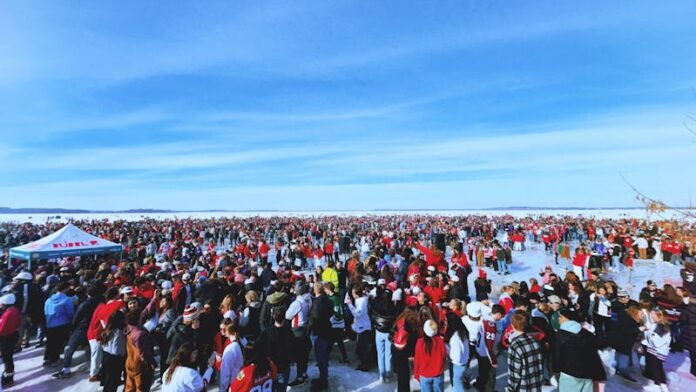Potential college students hear about fabled Wisconsin winters, the place snow blows from each path, ice coats the sidewalks of Bascom Corridor and Lake Mendota has frozen over. As soon as the lake has frozen, folks from everywhere in the neighborhood come collectively for Lily’s Traditional.
The occasion, informally often known as “Lily’s,” is an ice hockey match hosted yearly on the lake by the Sigma Alpha Epsilon (SAE) fraternity and has lengthy been a practice on the College of Wisconsin-Madison. The occasion is held to fundraise for Lily’s Fund for Epilepsy Research.
However due to the altering local weather, SAE canceled final 12 months’s occasion scheduled for Feb. 19.
The ice was not thick sufficient to help the burden of the hockey match and its viewers, usually drawing upwards of a thousand college students, residents and donors, in accordance with the Wisconsin Union.
That is considered one of many adjustments in historic climate patterns spurred by local weather change. Summer time 2023 noticed a drought, and this previous summer season extreme rainfall was recorded. Local weather consultants have been monitoring the climate, accumulating phenological information that assist clarify these adjustments and predict what could come subsequent.
Since 1950, Madison has seen extra rainfall on common than beforehand recorded. The summer season of 2023 didn’t observe this pattern due to El Niño, a cyclical local weather pattern occurring when the ocean floor is hotter than normal. This impacts winter in Wisconsin, making it hotter, wetter and reducing snowpack — explaining why Lake Mendota didn’t freeze over final winter.
With El Niño ending, La Niña, its counterpart, will start. La Niña happens when the ocean floor temperature cools. Throughout El Niño, winter in North America is usually drier, as seen final 12 months, whereas throughout La Niña, the other is true. The Nationwide Oceanic and Atmospheric Affiliation’s Local weather Prediction Middle expects extra precipitation than common this winter.
The rise in rainfall is only one facet of Wisconsin’s new climate patterns that Dr. Michael Notaro, director for the Nelson Institute for Environmental Research at UW-Madison, predicts it’ll happen over the following few years. Notaro advised the Cardinal rainfall is predicted to be extra extreme, whereas snowfall is predicted to reduce. Temperatures are growing in severity as properly — winters are predicted to be colder and summers hotter.
“We’re not anticipating an El Niño occasion through the winter of 2024-2025, in order that considerably reduces the percentages of an excessively low ice cowl winter and could also be excellent news for the Lily’s Traditional,” Notaro advised The Every day Cardinal. “After all, the long-term local weather change sign for Lake Mendota has been a shrinking ice season, so canceled winter occasions are going to turn into more and more extra seemingly with every passing 12 months.”
In keeping with Dr. Notaro, it’s seemingly Lily’s is canceled once more even with out the assistance of El Niño, as a result of international warming is affecting the local weather in Madison greater than ever.
Get pleasure from what you are studying? Get content material from The Every day Cardinal delivered to your inbox
The Every day Cardinal has been protecting the College and Madison neighborhood since 1892. Please take into account giving in the present day.

